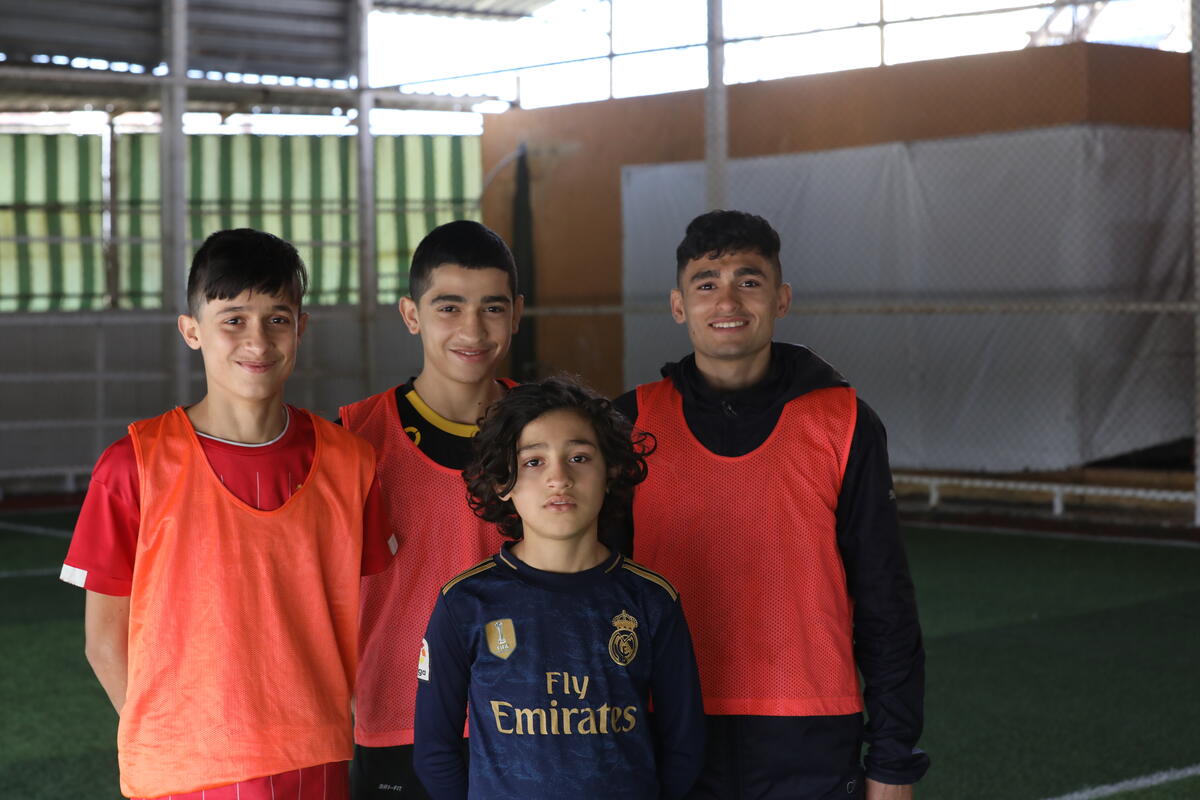Congolese refugee helps Zimbabwe tackle medical crisis
Congolese refugee helps Zimbabwe tackle medical crisis

HARARE, Zimbabwe, 27 June (UNHCR) - When Frank Nzabonimpa Ndayahoze arrives for work each day in Parirenyatwa Hospital, the flight of medical staff from the economic chaos of Zimbabwe is all too apparent. That problem also makes him a vivid example of the contribution that refugees can make to the nations that give them shelter.
"They need doctors and nurses," the 34-year-old Congolese doctor said in a hall of the government-run hospital. "Zimbabwe trains more every year, but after they get experience they leave. Many in the medical field leave every day - there are hard working conditions and low salaries."
The exodus of medical staff from countries like Zimbabwe could not come at a worse time. Ndayahoze spends most of his time treating victims of the HIV/AIDS epidemic, which has infected 20 percent of the population in Zimbabwe between the ages of 15 and 49. The average life expectancy of men in Zimbabwe is 37 years, for women a mere 34 years.
But no one could blame Zimbabwean doctors and nurses for accepting lucrative jobs in wealthy countries like Britain. Amid Zimbabwe's runaway inflation the monthly salaries of nurses have risen to 30 million Zimbabwean dollars, equal to US$300 at the official exchange rate - a mere $100 at the black market parallel rate that determines most consumer prices.
The economic crisis has provided a chance for refugees like Ndayahoze to show their value to the country that gave them sanctuary. His skills, acquired in the Democratic Republic of the Congo (DRC) and Zimbabwe, are needed. In the hospital, Ndayahoze has been joined by a nurse who is also a refugee from the DRC and another who fled Rwanda.
Ndayahoze is aware of others among the country's 14,000-strong refugee community with professions that might win a work permit, but knows that for most refugees life in Zimbabwe is more difficult. Zimbabwe registered reservations about clauses in the 1951 UN Refugee Convention that required host countries to let refugees work. Instead it requires them to have work permits similar to those needed by any foreigner. Job opportunities are rare outside of areas such as medicine.
In addition to the official obstacles to employing refugees, any chance of work has been exacerbated by an economic decline this decade that produced unemployment rates estimated at up to 80 percent of the labour force.
Ndayahoze would probably be working in DRC today if not for the fighting that erupted in the west of the country in the 1990s, part of the broader turmoil in the Great Lakes region. In 1997 the violence engulfed his family.
"At first our family dispersed when the rebels attacked our village and everyone fled," he said. "I lost touch with the rest of my family and decided to leave the country. It was 1999 by the time I next got in touch with my family. They were back home but it was still insecure so I didn't want to go back."
Ndayahoze had been at the University of Lubumbashi, preparing for entry into medical school. Once he had been recognised as a refugee in Zimbabwe, he approached UNHCR for assistance to continue his medical studies. In 1999 the ambitious young man was given a DAFI scholarship, a UNHCR programme funded by Germany that provides assistance to study at university.
In July 2003 he concluded his formal studies at the University of Zimbabwe, graduating with a bachelor's degree in medicine and surgery, and was placed at Harare's Parirenyatwa Hospital for his residency.
The soft-spoken doctor lives in a single room in a staff residence and works in the crowded casualty ward. The seven languages that he speaks, including the French used in DRC and English spoken in Zimbabwe, add to his value.
Unfortunately for Zimbabwe, Ndayahoze himself may soon join the brain drain from the country. In January 2005 he married a young woman he knew as a student in DRC. She lives in Canada and he hopes to join her.
His goal is to pass the Canadian exams to gain recognition of his medical credentials and follow it up by specialising in paediatrics and public health. Then it will be Canada that has gained from giving a home to this Congolese refugee.
By Jack Redden in Harare, Zimbabwe









